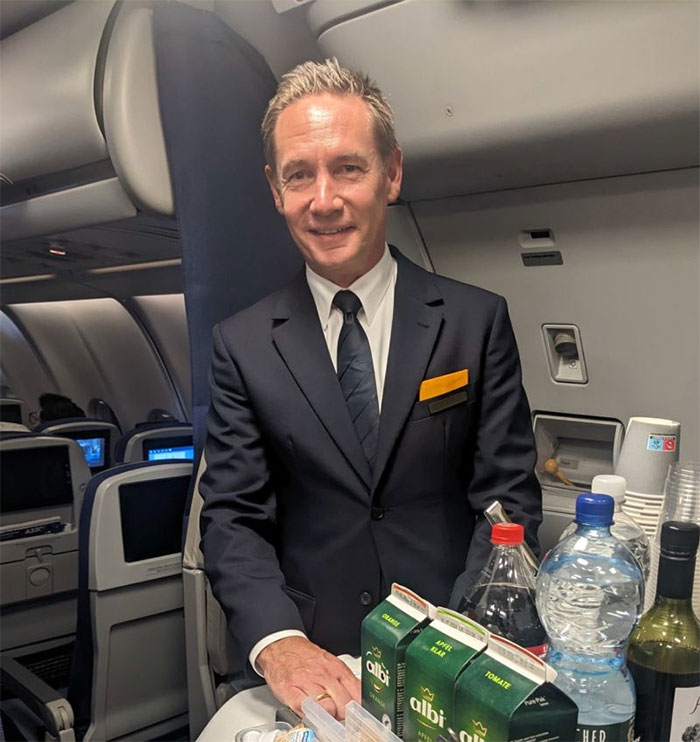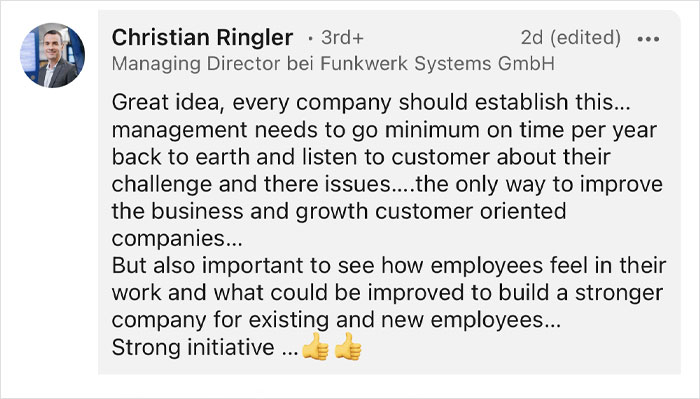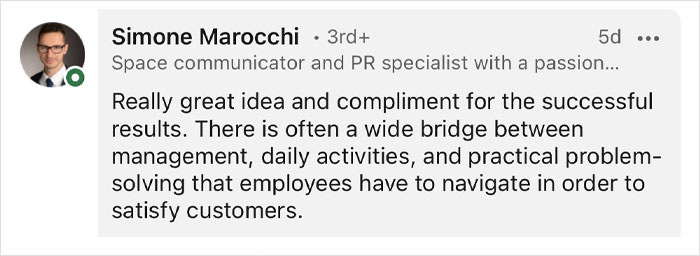
CEO Tries Working As A Flight Attendant To Gain Perspective, Shares His Insights
It goes a very long way when upper management puts in genuine effort to understand what their staff goes through every single day on the job. It shows respect, empathy, and humility. And it’s the mark of a great leader.
Lufthansa Airlines CEO Jens Ritter has recently gone viral on the internet and in the media. He shared on LinkedIn how he’d worked a shift as one of the flight crew and how it gave him new insights and a fresh new perspective. Check out the full story below! Bored Panda has reached out to the Lufthansa Group for comment via email.
Meanwhile, Bored Panda wanted to learn more about good management, so we reached out to Sam Dogen, the author of the bestselling book ‘Buy This, Not That: How to Spend Your Way to Wealth and Freedom’ and the host of the popular Financial Samurai blog. You’ll find our interview with Dogen as you read on.
Jens Ritter, the CEO of Lufthansa Airlines, recently went viral on social media and in the news
Image credits: Jens Ritter
The executive worked as a member of the cabin crew and shared the challenges he faced on the shift
Image credits: Jens Ritter
Image credits: Jens Ritter
Image credits: Jens Ritter
Image credits: Jens Ritter
Ritter has worked for Lufthansa Airlines for many years, including as a pilot
Ritter explained on LinkedIn that this was the first time that he had the opportunity to join the cabin crew on a flight, even though he’d worked as a pilot for many years. The Lufthansa Airlines CEO took care of the passengers flying to Riyadh and Bahrain, and then back again to Frankfurt.
According to Ritter, there were a few challenges that he faced. For instance, some of the meals offered on the plane didn’t match those on the menus. Meanwhile, the executive embraced dealing with different passengers, but noted just how difficult it was to be “present and attentive and charming” when all he wanted was to sleep.
“I was astonished how much I learned in these few hours. Deciding things in the office will be different after really feeling the decisions on board,” Ritter wrote, adding that there’s a lot more that the cabin crew have to organize than it might seem at first glance.
Ritter has been the CEO of Lufthansa Airlines for over a year, having taken the position on April 1, 2022. He trained as an Airbus A320 pilot at Lufthansa’s commercial pilot school in Bremen and started his flying career in 2000.
Eight years later, he became a long-haul pilot after switching to the Airbus A330/340. And in 2014, he qualified as a captain on the Airbus A320 at Germanwings. That same year, he took over as the head of Operations Efficiency & Strategy at Lufthansa Airlines. He was responsible for the operations of Austrian Airlines as Accountable Manager between 2016 and 2020.
In April 2021, Ritter became the Chief Operating Officer (COO) at the Executive Board of Eurowings. It was a year later that he joined the Executive Board of Lufthansa Airlines, as their CEO.
Image credits: Leio McLaren (not the actual photo)
Good leaders prioritize empathy and avoid micromanaging their staff
Bored Panda was interested in the type of message that’s sent when upper management works alongside ‘regular’ staff from time to time. Personal finance and management expert Dogen, the author of the bestseller ‘Buy This, Not That’ and the founder of Financial Samurai, shed some light on this.
“To be a good manager, you need to know the pain points that your most important employees are facing. Sitting in your ivory tower, telling people what to do and only looking at spreadsheets is not a great way to manage,” he explained to us via email.
“If the media and others want to pick up the story of a CEO working alongside the staff from time to time, then great if the attention can help attract more quality employees and customers,” he said.
“The most important thing is that senior management understands what their employees are going through, so they can best help them do their jobs better,” the expert told Bored Panda.
Meanwhile, we asked Dogen for his perspective on the qualities that employees tend to value the most in their bosses. “Empathy, charisma, and flexibility. Micromanagers are the worst!” he shared.
“Bosses who are empathetic towards an employee’s needs are more caring and less likely to judge when something goes wrong,” Dogen pointed out the importance of leaders who can put themselves in others’ shoes.
“Charismatic bosses make employees want to work harder. And flexible bosses enable employees to live a more balanced lifestyle,” the host of Financial Samurai said.
“One of the reasons why the FIRE [Financial Independence, Retire Early] movement might be becoming obsolete post-pandemic is that workers have much more flexibility. With more flexibility comes greater joy at work and less of a need to retire early.”
Employees value bosses who listen to their ideas and give credit where it’s due
The more in tune any manager is with their staff members, the better for everyone and for the company. A leader who becomes aware of their employees daily struggles is able to solve the problems they face far better than someone who’s stuck behind an office desk somewhere at the top of a skyscraper. For one, you have to identify that there are issues at all, and how pervasive they are.
It also helps if you have a direct line of communication with the staff members facing those challenges. They might have some great ideas on how to fix any issues at play here… all it takes is a leader who’s willing to actively listen to all opinions and then come up with a strategic plan.
Not only that, but executives who decide to put their ‘boots on the ground’ at times can identify staff that are full of potential and going above and beyond the call of duty. These leaders-in-the-making could be rewarded with raises and fast-tracked for management positions themselves. But again, it takes someone to spot that rising talent.
According to Forbes, 88% of employees want their leaders to be able to genuinely listen to them. However, only 60% of workers felt like their current boss met these expectations. Employers who work closely with their staff and are open to their ideas and suggestions can boost their morale, help create a healthier workplace environment, and increase profitability.
However, it’s not enough to simply listen to those ideas and then implement them. Employees value bosses who give credit where it’s due. Nobody wants to feel like their leader cough borrowed cough their idea and then claimed they came up with it. Though, of course, it’s not enough to just have an idea, someone still needs to implement it well. There needs to be a spirit of collaboration and transparency here.
Image credits: Mohammad Arrahmanur (not the actual photo)
Ritter isn’t the only executive who has worked as a ‘regular’ employee recently
On top of that, workers want bosses who give everyone room and support for growth and adapt their management techniques to fit each team differently. Meanwhile, passionate leaders who have integrity and always strive to ‘do the right thing’ inspire staff to be the best versions of themselves.
It’s not just Lufthansa Airlines CEO Ritter who has taken to spending time working shoulder-to-shoulder with his employees. The CEO of Air New Zealand, Greg Foran, was photographed serving water to passengers in December 2022.
Not only that, but the CEO of Starbucks, Laxman Narasimhan went viral in the media because he began his new job by completing barista training. The executive also promised to work shifts as a barista once a month from then.
“The past six months of my immersion into the company have been shaped by so many of you who have taught me about our very special culture at Starbucks. With you, I’ve experienced every aspect of the business to learn what it truly means to wear the green apron. You’ve welcomed me into our stores, trained me in how to be a barista … all to help me deeply understand what we do, how we do it, and the challenges and opportunities facing us,” Narasimhan wrote in a letter to his employees in March 2022.
“To keep us close to the culture and our customers, as well as to our challenges and opportunities, I intend to continue working in stores for a half day each month.”
Here’s how the LinkedIn community reacted to the CEO’s actions
63Kviews
Share on FacebookI used to drive an HGV delivering steel, it involved a lot of deliveries to small building sites and businesses that had no cranes or FLTs. Between 3 and 10 tons of handball a day, you earned your wage! I had a trip with a boss and he asked if I needed to go to gym after a day at work ‘to burn off some energy’. I told him to join a driver for week. 😂 We destroyed him, fair play to him, he came out on 3 days but after that he bowed out, I bet he didn’t go to the gym that week 😀 He treated us differently after that!
Did he work for their pay rate? Because that would've been an eye opener.
Nah; the money he’d make wouldn’t even be equal to any given tip he leaves, but he wouldn’t be able to feel the punch because he doesn’t hafta also try to LIVE on that wage. Now had he been forced to live on it? That’d be entirely different! As it is, he’d prolly just turn down the Pennie’s he’d be offered as they’re meaningless to him.
Load More Replies...I used to drive an HGV delivering steel, it involved a lot of deliveries to small building sites and businesses that had no cranes or FLTs. Between 3 and 10 tons of handball a day, you earned your wage! I had a trip with a boss and he asked if I needed to go to gym after a day at work ‘to burn off some energy’. I told him to join a driver for week. 😂 We destroyed him, fair play to him, he came out on 3 days but after that he bowed out, I bet he didn’t go to the gym that week 😀 He treated us differently after that!
Did he work for their pay rate? Because that would've been an eye opener.
Nah; the money he’d make wouldn’t even be equal to any given tip he leaves, but he wouldn’t be able to feel the punch because he doesn’t hafta also try to LIVE on that wage. Now had he been forced to live on it? That’d be entirely different! As it is, he’d prolly just turn down the Pennie’s he’d be offered as they’re meaningless to him.
Load More Replies...
 Dark Mode
Dark Mode 

 No fees, cancel anytime
No fees, cancel anytime 











































































77
31